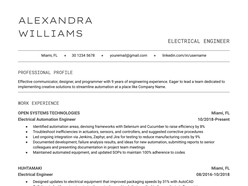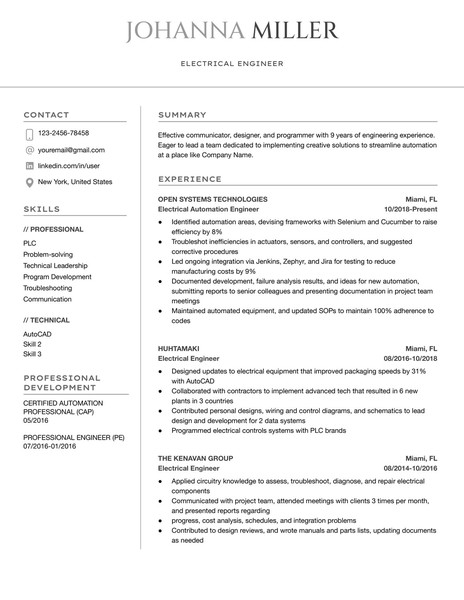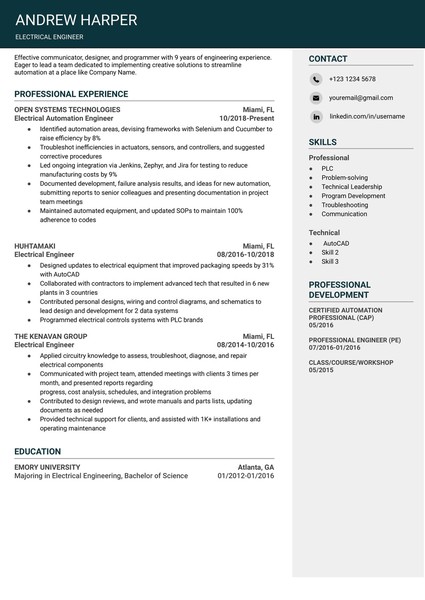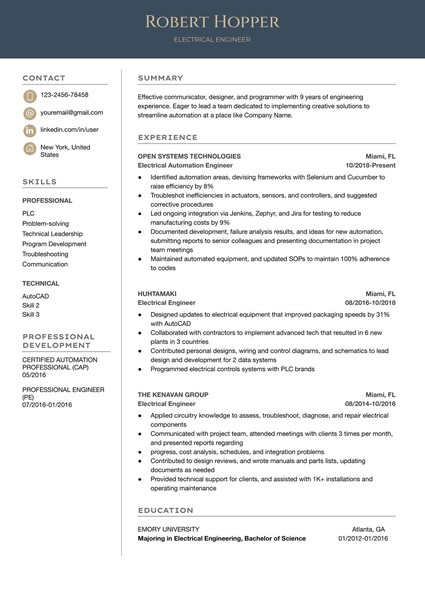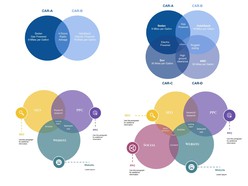How to Download and Use the Templates
Follow these steps to access and customize a Google Docs template efficiently:
- Browse Available Templates
Review the curated collection and identify a format that aligns with your event style and scheduling needs. - View Template Details
Select a template to open its dedicated detail page, where layout structure and key features are outlined. - Download the Template
Click the Download Template button to open the document directly in Google Docs. - Start Editing in Google Docs
In the opened document, select Use Template (top-right corner) to generate an editable copy. - Sign In to Google
Make sure you are signed into a Google account — this is required to save, personalize, and begin editing the template.
Once saved, the template becomes a fully customizable document — ready for editing, printing, or digital sharing with minimal setup.
Key Sections of an Electrical Engineer Resume
1. Contact Information
Start your resume with your essential contact details:
- Full name
- Phone number
- Professional email address
- Location (city and state/country)
- LinkedIn profile URL (optional)
- Personal website or portfolio link (if applicable)
2. Professional Summary
Your professional summary is a brief overview of your career, typically 2-3 sentences long. It should highlight:
- Years of experience in electrical engineering
- Areas of expertise
- Key achievements or specializations
- Career objectives or what you bring to the table
"Innovative Electrical Engineer with 5+ years of experience in power systems design and renewable energy integration. Expertise in circuit analysis, SCADA systems, and energy efficiency optimization. Seeking to leverage my skills in sustainable energy solutions to drive innovation at GreenTech Solutions."
3. Skills
List both technical and soft skills relevant to electrical engineering. Consider creating two columns for better organization:
| Technical Skills | Soft Skills |
|---|---|
| Circuit Design | Project Management |
| AutoCAD | Problem-Solving |
| MATLAB | Team Leadership |
| PLC Programming | Communication |
| Power Systems Analysis | Creativity |
4. Work Experience
Present your work history in reverse chronological order, including:
- Job title
- Company name
- Dates of employment
- 3-5 bullet points highlighting key responsibilities and achievements
Senior Electrical Engineer | EnergyTech Solutions | Jan 2018 - Present - Led a team of 5 engineers in designing and implementing a smart grid system, resulting in a 15% increase in energy efficiency for a major metropolitan area - Developed and optimized control algorithms for renewable energy integration, improving system stability by 25% - Authored technical reports and presented findings to stakeholders, securing $2M in additional funding for green energy projects
Remember to quantify your achievements whenever possible to provide concrete evidence of your impact.
5. Education
List your educational background, including:
- Degree(s) earned
- Institution name
- Graduation date
- Relevant coursework or academic projects (optional)
Master of Science in Electrical Engineering | Stanford University | May 2017 - Specialization in Power Systems and Renewable Energy - Thesis: "Optimization of Microgrid Systems for Rural Electrification" Bachelor of Science in Electrical Engineering | University of Michigan | June 2015 - Minor in Computer Science - Senior Project: Design of a Solar-Powered Water Purification System
6. Certifications and Licenses
Include any relevant certifications or licenses you've obtained:
- Professional Engineer (PE) license
- IEEE certifications
- Specialized training or courses
7. Projects
Highlight significant projects that showcase your skills and experience:
- Project name
- Your role
- Technologies or methodologies used
- Outcomes or impact
Smart Home Energy Management System - Designed and implemented an IoT-based system to optimize home energy consumption - Utilized Arduino, Raspberry Pi, and cloud computing for real-time monitoring and control - Achieved an average of 30% reduction in energy costs for pilot users
8. Professional Affiliations
List memberships in relevant organizations, such as:
- Institute of Electrical and Electronics Engineers (IEEE)
- International Society of Automation (ISA)
- National Society of Professional Engineers (NSPE)
Tailoring Your Resume
To maximize your chances of landing an interview, tailor your resume for each job application:
- Analyze the Job Description: Carefully read the job posting and identify key requirements and desired skills.
- Customize Your Professional Summary: Adjust your summary to align with the specific role and company.
- Highlight Relevant Skills: Emphasize the skills and experiences that best match the job requirements.
- Use Industry-Specific Keywords: Incorporate relevant terms and phrases from the job description throughout your resume.
- Reorder Sections: Place the most relevant information closer to the top of your resume.
Common Mistakes to Avoid
- Overloading Information: Keep your resume concise and relevant, typically no more than two pages for experienced professionals.
- Neglecting Soft Skills: While technical skills are crucial, don't forget to highlight your soft skills like leadership, communication, and problem-solving.
- Ignoring Formatting: Ensure consistency in fonts, sizes, and spacing throughout your resume.
- Using Jargon Excessively: While industry-specific terms are important, make sure your resume is still understandable to non-technical recruiters.
- Failing to Proofread: Typos and grammatical errors can significantly impact your chances. Always double-check your resume before submitting.
Final Tips for a Standout Resume
- Quantify Achievements: Use numbers and percentages to demonstrate the impact of your work.
- Use Action Verbs: Start bullet points with strong action verbs like "designed," "implemented," or "optimized."
- Keep it Current: Regularly update your resume with new skills, projects, and achievements.
- Customize for the Future: If you're targeting a specific area of electrical engineering, emphasize relevant experiences and skills.
- Seek Feedback: Have peers, mentors, or professional resume writers review your resume for suggestions.

